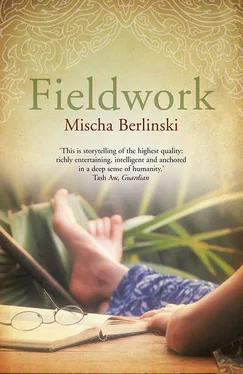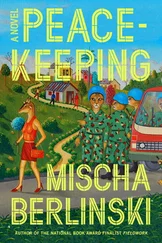and
the institution of bride-price, by which the groom's family compensated the bride's family for the trouble and expense of raising the
*To summarize something that took Martiya upwards of two months to realize: a clan was an extended family, and membership in the clan was passed in the same way as family name in Western culture — it was inherited from the father. Lai-Ma had been born in the Bird clan, but upon marriage entered into Farts-a-Lot's Fish clan. Her daughters would leave the clan; her sons would stay within it. Just what a clan really meant to its members, what bonds of emotional loyalty the clan demanded, what protections the clan offered — these were questions it would take Martiya years to answer.
daughter; a sufficient bride-price seemed reason to ignore or violate some but not all of the other marriage rules;
never forgetting
all of the natural drama of the human heart, which overwhelmed by passion and desire, inevitably produced exceptions to any and every rule Martiya thought she had established as an absolute of Dyalo romantic life.
Thank God , Martiya thought, the Dyalo weren't polygamous.
The genealogical work inevitably provoked questions about Martiya's own love life, and at first Martiya was not sure just how to explain her particular position as an unmarried, independent adult. There was simply no place in the Dyalo mind for such a remote and isolated creature. Indeed, so strange were the looks that Martiya received when first questioned about her marital status that to save the time and trouble of explaining the complicated kinship rules of her own culture, she invented a fictitious husband waiting for her back home. It had started out as a simple white lie, on a stifingly hot and humid afternoon when her patience was low, but very quickly Martiya realized the advantages of the story. Some of her most successful attempts at building rapport with local women had been when she had discussed her wedding, her bride-price, and her relations with her in-laws, a subject that was almost an obsession among Dyalo women. Martiya named her husband Pierre, for no reason at all, and Pierre, which the Dyalo pronounced "Pell," very quickly became something of a character in the village. Like all villagers everywhere, the people of Dan Loi were naturally gossipy, and stories about Martiya's man were legion: Pell was as tall as two Dyalo men, with a head of brilliant blond hair and the strength of a water buffalo; Pell was so wealthy that he ate pig every day, which was necessary on account of his ferocious sexual appetites. On one of Martiya's visits to the lowland, she bought a magazine with photographs of Hollywood celebrities, and clipped a picture of Robert Redford. "This is Pell," she told the women when she came back to the village. The women puzzled over the strange figure, trying to interpret the photograph and the man. Nobody in the village had ever seen blond hair before, or knew that humanity came in such a pale color. Is he a ghost ? they asked — and it took Martiya a moment to realize that the question was asked with absolute sincerity.
The stories became more elaborate as time went on: Martiya, the villagers said, had been forced to flee from her own village because Pell had beaten her so cruelly; but he had beaten her so cruelly because she had taken a lover. As these stories spread through the village, women whom Martiya hardly knew now sought her out and invited her to tea in their huts, where they asked her one question over and over again: Was it true about the size of the white man's penis?
Absolutely, Martiya said.
As big as this? the women asked, and spread their hands apart.
As big as this , Martiya said, spreading hers wider.
Koo-koo , the women said.*
Martiya could only take about two hours of genealogical work a day before she began to fear that her brain might explode. (And her back: the Dyalo did not have chairs, and these conversations with Dyalo matrons would be conducted either sitting directly on the hardwood floors of Dyalo homes or teetering on the edges of tiny stools. Martiya would balance her notebook on her knees, while the Dyalo women would engage in household busywork: finely chopping peppers and onions, sorting herbs, preparing poultices of medicinal leaves, tying together brush grass to make brooms or roofing tiles, or weaving industriously at a loom.) The stories she heard were frequently of the so-my-sister's-second-cousin-decided-to-marry-her-father's-brother's-third-son type, and it took all of Martiya's mental discipline to remember that behind these dry accounts of interlinked clans, there were couples; and behind the couples, humanbeings who lived and loved.
Or were there? Did the Dyalo see anything the way she did? The Dyalo, after all, didn't even have a word for "love," a fact Martiya recalled from her readings about Dyalo life before leaving Berkeley, and con
*I'm not making this stuff up. Really. See Otome Klein Hutheesing, Emerging Sexual Inequality Among the Lisu of Northern Thailand: The Waning of Dog and Elephant Repute (Leiden: Brill, 1990), pp. 147–53, for a discussion of what the author calls the "big phallus complex" among the Lisu, another of the northern Thai tribal peoples. I can confirm that it is, in fact, true about the size of the white man's penis.
firmed upon arrival in Dan Loi. Perhaps, Martiya thought, the Dyalo simply had no notion of romantic love at all.
Just when Martiya had convinced herself that the gulf between her emotions and the Dyalo's was unbridgeable, like social intercourse between cats and porpoises, somebody would inevitably tell her a story that would suggest entirely the opposite. There was, for example, a couple who lived on the far edge of the village. The wife had elegant high cheekbones, long wavy black hair, and a distracted, flirty, inefficient saunter, as if her neighbors' thatch huts were shop windows and in place of two buckets of water, a pair of invisible shopping bags from Saks Fifth Avenue dangled from the ends of her long arms; in her letters to Karen, Martiya always called her "Miss Dan Loi." Her husband had the spare good looks of the star of a Hong Kong kung-fu movie. They made a pretty pair, and were expecting their first child.
The gossip about the couple was this: in her village, two days' walk in the direction of the rising sun, past Scary Mountain and Wild Pig village, she had been the eldest daughter of a wealthy family, her slender arms covered from wrist to elbow in silver bangles. He, by contrast, came from one of the poorest families in Dan Loi, one of those families who lived on the far edge of the village and, in the last few weeks before the rice was harvested, lived only on jungle roots. That kind of people, that kind of story: when they met, the instant ardor of the couple was matched in intensity only by the disapproval of her family. Of course the match was prohibited — or, rather, the boy was told that if he wished her hand, he would need to compete with all the other suitors for her bride-price. Her father was stern, her mother sterner, her grandmother sternest: such a boy, they sniffed, was entirely unsuitable. There were considerations of clan, and another far more appropriate suitor, a fat patrilateral cousin, had sniffed in her direction. Now the story took the wonderful, the utterly human , twist. The girl, saying nothing, secretly began to meet her lover in the jungle; and every time they met, she gave him a handful of silver. She gave him all her bangles, and then stole her sisters', and then her mother's, and then her uncompromising old grandmother's. She took everything in the household that wasn't nailed down, including a piglet, and gave it to her lover, and in this way, she stole her own bride-price from her own intransigent family. The marriage followed forthwith. Really, what choice did anyone have? Martiya herself was charmed by the story, and charmed also by the laughter of her Dyalo informants as they recounted the story.
Читать дальше












